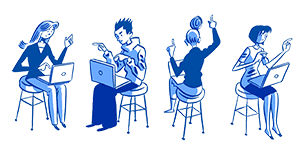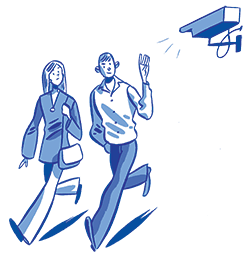Douglas Coupland: Atomised
Roula Khalaf, Editor of the FT, selects her favourite stories in this weekly newsletter.
Last summer in Reykjavik I learnt that one in 10 Icelanders will write a novel in their lifetime. This is impressive but I suppose the downside is that each novel only gets nine readers. In a weird way, our world is turning into a world of Icelandic novelists, except substitute “blog”, “vlog” or “website” for “novel” – and … there we are. A defining sentiment of our new era is that never before has being an individual been so easily broadcast, yet never before has individuality felt so ever-increasingly far away. Before the 21st century, we lived with the notion of one’s self as a noble citizen of the world, a lone soul whose life was a story written across a span of seven decades. Instead, we now live with the ever-gnawing sensation that one’s self is really just one more meat unit among seven billion other meat units.
This 21st-century crisis of individuality expresses itself in many ways. In Japan there is the phenomenon of the hikikomori. Your child grows up, leaves home and then, after a few years, returns home and never leaves his or her bedroom ever again. Ever. The rare hikikomori will venture out in the middle of the night to visit a local minimart but that’s it. In 2010, the Japanese government estimated there were 700,000 hikikomori in Japan. Yes, you read that correctly: almost three-quarters-of-a-million modern-day elective hermits back with mom and dad, and they are psychologically incapable of ever leaving. Ever.
I suspect what these young people are experiencing is what I term “atomophobia” – the fear of feeling like an individual. After the late-1980s bubble burst, Japan went from being a monolithically homogenised culture with guaranteed lifetime employment, into its exact opposite: a land of hyperindividuality trapped inside a consumer hyperspace that guarantees nothing, let alone employment. The crazy costumes mainly worn at weekends in the Harajuku district of Tokyo are now regular, uncommented-upon Japanese daywear. One might think that a culture in which its everyday citizens dressed in borderline Halloween costumes was a culture of fierce individuality; instead it is a society deeply conflicted about the dark side of enforced uniqueness. “The more like ourselves we become, the odder we become,” wrote Louise Adler, an Australian publisher. “This is most obvious in people whom society no longer keeps in line; the eccentricity of the very rich or of castaways.”

In North America and the UK we have the trend of “normcore” (the normal version of hardcore), a trend so stupid that it’s more famous for being a stupid trend than it is for being a trend itself. But normcore actually is something real, and is a unisex trend that very much exists. Heat magazine tells us: “Normcore celebrates the ordinary with its reliance on brazenly bland staples such as stonewashed denim, label-less shirts, and pool sandals that bear a distressing resemblance to Crocs. It’s the ultimate knee-jerk reaction not only to the meticulously dour Hipster look, but the demands of fashion in general.”
Normcore is about dressing to be invisible, the fashion equivalent of renting a mid-size American-made sedan in a large US city: total anonymity that offers abdication from the responsibility of having to be an individual living in real time in the real world. Normcore says, “Screw it. Go ahead: monitor me on CCTVs. Scan the internet with facial recognition algorithms. Have the NSA read my emails like tea leaves. I’m going to be deliberately un-unique. I am going to punish the world with my blandness, and if you scan my metadata, you’ll fall asleep before you find anything good.”

I wonder if the need for individualism may, in fact, be a form of brain mutation spread lightly throughout a population. I wonder if most human beings were cut out to cope with the psychic vacuum that freedom can create. I get the impression from the daily news that there are a lot of people out there, possibly a majority, who don’t actually want progress – or the freedom progress brings. I also get the impression that most people are happy to belong to a group – any kind of group – and they mistrust someone who doesn’t feel similarly. And I also get the impression there are a lot of people out there who perceive chaos as freedom – which is somehow embarrassing. Sometimes I even wonder if feeling unique is an indication of actually being unique – even though it is the feeling of uniqueness that convinces us we have souls and are individuals.
You have a blog. She posts on Facebook three times a day. They have a website. Sigrid wrote a saga. The novel made us individuals. The internet makes us units. Write as fast as you can. Blog like crazy. Vlog your brains out. Be unique. Be the best you can be. One thousand years ago you assumed your grandchildren’s lives would be identical to your own. In 2014 we know that 2020 is going to be very different and possibly quite scary compared with what we have now. How shall we dress for the occasion?
Douglas Coupland’s next book is a non-fiction title, ‘Kitten Clone’, published by Visual Editions on September 25 (£25)
Twitter: @dougcoupland
Illustrations by Jason Ford
Comments